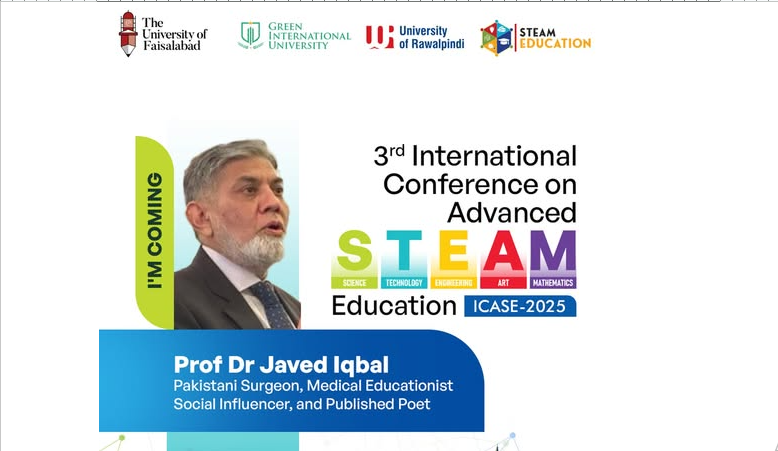Teaching Across Time: Redefining Learning for a New Generation
Education is evolving rapidly, driven by technological innovation, changing learner demographics, and the growing influence of digital culture. At the STEAM Conference 2025, the session “Teaching Across Time: Redefining Learning for a New Generation” explored innovative pedagogical strategies tailored for contemporary learners, held in Amin Auditorium, Venue 3, under the Dermal Science track.
The session was chaired by Dr. Musarrat Ul Hassnain (Rai Medical College, Sargodha), who emphasized the importance of adapting teaching methods to meet the needs of Generation Z and future learners. Supporting her as Co-Chair, The University of Faisalabad highlighted how research-driven pedagogy can enhance engagement, clinical reasoning, and learning outcomes in medical and health education.
Keynote Insight: Team-Based Learning vs. Traditional Lectures – Javed Iqbal
The session began with an invited talk by Javed Iqbal, a Pakistani surgeon and medical educationist, who presented a crossover comparison of team-based learning (TBL) with traditional lectures in forensic medicine education. His research demonstrated that TBL enhances students’ application of knowledge, critical thinking, and collaborative skills, providing a model for modernizing medical curricula.
Invited Talks Exploring Innovative Pedagogy
Digital Resilience Mapping for Undergraduate Students – Shirza Nadeem & Noor-i-Kiran
Shirza Nadeem and Noor-i-Kiran presented research on promoting digital resilience among undergraduate medical students in Pakistan. Using the DR Compass framework, their study explored strategies for managing academic stress, enhancing mental well-being, and fostering adaptive learning behaviors in digitally connected classrooms.
Gamification in Dental Education – Komal Atta (The University of Faisalabad)
Komal Atta discussed the integration of gamification into BDS education to enhance cognitive engagement, clinical reasoning, and learner agency. By leveraging game-based strategies, students were found to exhibit higher motivation, active participation, and deeper understanding of complex clinical scenarios.
V-Logging as a Pedagogical Tool – Sana Arshad (The University of Faisalabad)
Sana Arshad highlighted the use of v-logging for Gen Z learners as a method to boost engagement and learning. Her research showed that student-generated video content promotes creativity, self-expression, and peer-to-peer learning, aligning with the preferences and learning styles of modern students.
Gen Z and Academic Reading in the AI Era – Kinza Arif (The University of Faisalabad)
Kinza Arif explored how artificial intelligence affects academic reading habits among Gen Z students. The study provided insights into how AI tools can support or hinder comprehension, critical thinking, and scholarly engagement, emphasizing the need for adaptive teaching strategies.
Does AI Kill Student Creativity? – Amna (ABWA Medical College, Faisalabad)
Amna presented undergraduate perspectives on the influence of AI on creativity. While AI offers tools for efficiency and knowledge access, students expressed concerns about over-reliance potentially stifling independent problem-solving, highlighting the importance of guided integration of technology in pedagogy.
Panel Discussion: Bridging Generations in Education
The session concluded with a panel discussion on bridging pedagogical strategies across generations. Experts highlighted the importance of:
- Adapting curricula to the needs of digital-native students
- Balancing traditional instruction with innovative, technology-driven methods
- Encouraging critical thinking, creativity, and learner autonomy
- Designing inclusive, flexible, and engaging learning environments
- Leveraging AI and digital tools responsibly to enhance learning without compromising creativity
Why Redefining Learning Matters
This session emphasized the transformative potential of innovative pedagogy in modern education:
- Enhances engagement, collaboration, and active learning
- Supports mental well-being and resilience among students
- Integrates technology without compromising critical thinking
- Prepares students for future academic, clinical, and professional challenges
- Provides actionable strategies for educators to modernize teaching practices
By blending traditional and digital methodologies, educators can cultivate adaptable learners capable of thriving in evolving educational and professional landscapes.
Conclusion
The session made it clear that teaching must evolve to meet the needs of a new generation. Guided by Dr. Musarrat Ul Hassnain and The University of Faisalabad, and enriched by insights from Javed Iqbal, Shirza Nadeem, Noor-i-Kiran, Komal Atta, Sana Arshad, Kinza Arif, and Amna, the discussion highlighted that modern education requires creativity, digital integration, and student-centered pedagogy.
By embracing innovative strategies such as gamification, v-logging, AI-supported learning, and team-based approaches, educators can redefine learning to be more engaging, effective, and relevant for Generation Z and beyond.

